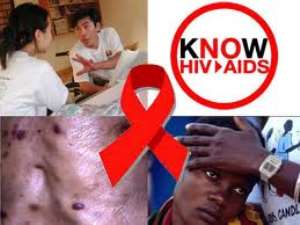
Twenty –five (25) People Living with HIV (PLWHIV) in Brong-Ahafo have been trained as Community Paralegals to help create a platform at the community level where PLHIVs would seek legal redress.
The four-day community paralegal training workshop was under the auspices of the International Federation of Women Lawyers (FIDA) Ghana in collaboration with WOMANKIND UK.
FIDA-Ghana, a non-profit organization which is working to enhance the status of women and children in Ghana, over the years has embarked extensively on educating, creating awareness and sensitizing the populace on issues that affect the welfare and liberation of women and children.
It has also been on the forefront of promoting laws and policies that would enhance the status of women, whiles moving for the reform of obsolete, ineffective, discriminatory and debasing laws, especially with regards to women's rights.
The participants were taken through topic s such as “Human Rights and HIV/AIDS”, “The Rights of the Ghanaian Woman”, “Marriage and Divorce Laws in Ghana”, “Basic Counseling Techniques “and Legal Ethnics and the Paralegal”.
Presenting a paper on the topic “Legal Ethnics and the Paralegal”, the Executive Director of FIDA Ghana, Jane Quaye, said as Paralegals they should make human rights as a fundamental part of the advice they would give to people.
She noted that some of the good qualities of Paralegals are to treat all people with respect and dignity, ensure confidentiality and be honest with their advice seekers.
According to her, the community paralegals have a significant role to play in women's access to justice at the community level, saying the skills they have learnt would enable them to act as a referral point in their communities.
In her presentation on the topic: “The Domestic Violence Act, 2007”, Madam Irene Aborchie Nyahe, told the trainees that victims of domestic violence who have filed a complaint with the police are entitled to free medical treatment from the state if treatment is necessary.
She informed them that the police may arrest a person for the offence of domestic violence with a warrant issued under the Domestic Violence Act or without a warrant.
Madam Aborchie Nyahe, urged the participants to raise awareness in their various communities that domestic violence is a crime, and not justice “domestic dispute”.
She noted that in the past, there has been difficulty in controlling domestic violence because victims did not usually report the abuse because they were socialized to believe that such issues should be handled within the family.




 Saglemi Housing Project will not be left to rot – Kojo Oppong Nkrumah
Saglemi Housing Project will not be left to rot – Kojo Oppong Nkrumah
 Transport fares hike: GPRTU issue two-day ultimatum
Transport fares hike: GPRTU issue two-day ultimatum
 ARC endorses Alan as presidential candidate – Buaben Asamoa
ARC endorses Alan as presidential candidate – Buaben Asamoa
 Akufo-Addo appoints Kwasi Agyei as new Controller and Accountant-General
Akufo-Addo appoints Kwasi Agyei as new Controller and Accountant-General
 PNC dismiss reports of mass resignations
PNC dismiss reports of mass resignations
 PAC advocates for revenue collectors to be engaged on commission basis, not full...
PAC advocates for revenue collectors to be engaged on commission basis, not full...
 Genser Energy commissions 110km of natural gas pipeline at Anwomaso
Genser Energy commissions 110km of natural gas pipeline at Anwomaso
 Naa Torshie calls for tolerance, peace ahead of 2024 election
Naa Torshie calls for tolerance, peace ahead of 2024 election
 Asantehene commends Matthew Opoku Prempeh for conceiving GENSER Kumasi Pipeline ...
Asantehene commends Matthew Opoku Prempeh for conceiving GENSER Kumasi Pipeline ...
 Let’s do away with ‘slash and burn politics’ in Ghana — Dr Adutwum
Let’s do away with ‘slash and burn politics’ in Ghana — Dr Adutwum
